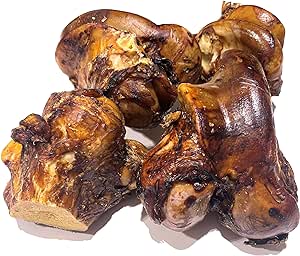Looking for a treat that’ll keep your dog entertained for hours? Beef knuckle bones might just be your answer. These natural chews are not only delicious for your furry friend but also offer a myriad of benefits, from promoting dental health to keeping their jaws strong.
In this article, you’ll discover why beef knuckle bones are a top choice for dog owners seeking a safe and satisfying option for their pets. Get ready to dive into the world of these tantalizing treats and learn how they can contribute to your dog’s well-being.
The Benefits of Beef Knuckle Bones for Dogs
When looking to treat your canine friend, you might consider the various benefits beef knuckle bones can offer.
High in Nutrients
Beef knuckle bones are packed with essential nutrients that contribute to your dog’s overall well-being. They contain calcium and phosphorus which support healthy bones and teeth, as well as giving a boost to your pet’s diet with valuable proteins and fats.
Dental Health
Chewing is a natural and necessary activity for dogs, and when they gnaw on beef knuckle bones, it aids in maintaining dental hygiene. It scrapes away plaque, controls tartar buildup, and keeps their gums strong.
- Reduces the risk of periodontal diseases
- Freshens breath by cleaning the teeth naturally
Mental Stimulation
Chewing on bones is more than just a way to pass time. It provides a mental workout, keeping your dog mentally stimulated and reducing anxiety. The act of chewing can be a calming activity, offering an outlet for natural behavior.
Joint Health
Beyond the teeth-strengthening advantages, the cartilage and soft tissues surrounding a beef knuckle bone can be beneficial for your dog’s joints, supplying a source of glucosamine and chondroitin which are known for their role in maintaining joint health.
Long-Lasting Entertainment
With their significant size, beef knuckle bones offer extended periods of engagement compared to other chews which helps prevent boredom and potentially destructive behaviors.
Each of these benefits points to why beef knuckle bones are an excellent choice for keeping your dog happy and healthy. By integrating this natural chew into your pet’s routine, you’re providing them with a snack that’s not just satisfying but also improbably beneficial in multiple aspects of their health and wellbeing.
Promoting Dental Health
Chewing on beef knuckle bones provides a natural form of dental care for your dog. The chewing action helps to remove plaque and tartar buildup, both of which can lead to serious dental health issues. It’s a way to clean their teeth without the need for invasive methods, and it doesn’t involve the struggle that often comes with brushing your pet’s teeth manually.
When your dog gnaws on a beef knuckle bone, they’re engaging in a process that massages their gums and improves blood circulation. This can prevent bad breath and reduce the risk of gum diseases like gingivitis. Moreover, it promotes the maintenance of stronger teeth by helping to scrub away food residue and bacteria. A study conducted by the American Veterinary Medical Association suggests regular dental care, including chew activities, can extend a dog’s life expectancy.
The high mineral content in these bones, specifically calcium and phosphorus, are essential for maintaining healthy teeth and bones. Adding beef knuckle bones to your dog’s diet equips them with the necessary nutrients required for a robust dental structure.
Enrichment through chewing also prevents dogs from directing their chewing behavior toward inappropriate items. Chewing on suitable objects helps maintain proper dental hygiene, reducing the incidence of costly dental procedures in the long run.
By incorporating beef knuckle bones into their chewing routine, you’re not only supporting your dog’s dental health but also promoting a beneficial habit that contributes to their overall well-being.
Strengthening Jaws
When it comes to improving your dog’s jaw strength, beef knuckle bones serve as an excellent tool. The act of gnawing on these tough bones provides a solid workout for the muscles in the jaw, leading to significantly stronger jaws over time.
- Encourages natural jaw exercise
- Increases muscle tone
- Enhances jaw strength and durability
Regular chewing on beef knuckle bones works the whole musculature of the jaw. This action not only strengthens the muscles but also ensures that the joints in the jaw are healthy and functioning correctly. Dogs that engage in this form of natural exercise tend to have:
- Fewer dental issues
- Better joint mobility
- Enhanced ability to chew food properly
Real-life examples confirm the positive impact of beef knuckle bones on jaw strength. Vets often observe that dogs who chew on such bones present with lower instances of jaw-related ailments that are common in others.
Furthermore, behavioral benefits arise from this practice. Chewing is a natural stress reliever for dogs, and by providing an appropriate item to chew on, you help to redirect any destructive behaviors and foster a calmer demeanor.
Instead of turning to potentially harmful objects, your dog has an outlet that’s beneficial both for mental stimulation and physical health. A systematic approach to including beef knuckle bones in your dog’s diet can pave the way for a healthier, happier pet with a robust and powerful jaw.
Choosing the Right Beef Knuckle Bones
When selecting beef knuckle bones for your canine companion, it’s essential to look for high-quality sources. Ideally, these bones should be sourced from grass-fed cattle, ensuring they are not only healthier but also free from harmful additives. The quality of the bone can significantly impact the nutrients your dog will get and reduce the risk of potential health hazards.
Consider the following when picking beef knuckle bones:
- Size Matters: Opt for a bone that matches your dog’s size. Large breeds can handle bigger bones, while smaller dogs need appropriately sized options to prevent choking hazards.
- Uncooked is Key: Raw bones are generally safer than cooked ones, as cooking can make the bones splinter, posing a serious risk.
- Watch for Freshness: Always check for freshness. Fresh bones are less likely to harbor bacteria that can lead to foodborne illnesses.
- Organic Options: If possible, choose organic bones, which guarantee the absence of pesticides and antibiotics, contributing to your pet’s overall health.
By being vigilant about where you source the beef knuckle bones and which bones you choose, you’re taking a significant step towards supporting your dog’s dental health and jaw strength. It’s not just about giving them something to chew; you’re providing a beneficial health supplement to their diet.
Moderation is key with any dietary addition. Ensure that your dog’s bone-chewing sessions are supervised, especially when introducing beef knuckle bones into their routine for the first time. This oversight ensures that any potential risks are immediately managed, and your dog’s health is safeguarded.
Beef knuckle bones from reputable sources bring peace of mind. You’ll know that the time your dog spends gnawing away isn’t just enjoyable – it’s building their health with every bite.
Safety Precautions for Giving Beef Knuckle Bones to Dogs
When it comes to keeping your furry friend safe while enjoying beef knuckle bones, being proactive is key. Always supervise your dog when they’re gnawing on these bones. It’s the best way to prevent choking and ensure that they’re not biting off more than they can chew, quite literally.
Select the appropriate size of bone for your dog. Large breeds may handle bigger bones well, while smaller breeds will need smaller bones to avoid dental damage or choking hazards.
Keep in mind that not all bones are created equal. Beef knuckle bones should always be raw; cooked bones can splinter and cause internal damage or blockages. It’s essential to source these bones from reputable suppliers to avoid the risk of contamination.
To ensure your dog’s safety, replace the bone before it gets too small. Small pieces can be swallowed whole, presenting a choking risk or causing gastrointestinal blockages.
Monitor your dog’s dental health. Some dogs may suffer from teeth fractures if they chew too aggressively on hard bones. If you notice any blood or extreme discomfort while your dog chews, it’s time to take the bone away and consult your vet.
Lastly, introduce beef knuckle bones slowly into your dog’s diet. This allows you to observe any adverse reactions or allergies, ensuring their gastrointestinal system can handle the new addition.
Remember, moderation is vital. Limit bone-chewing sessions to prevent excessive wear on the teeth or potential digestive issues from overindulgence.
Conclusion
You’re now well-equipped to make an informed decision about beef knuckle bones for your dog. Remember, they’re not just a treat; they’re a tool for maintaining your dog’s dental health and jaw strength. Keep in mind the size and quality of the bones you choose, and always supervise your furry friend during chew sessions. By following the guidelines you’ve learned, you can safely incorporate this natural chew into your dog’s health regimen, ensuring they reap the benefits while minimizing risks. Happy chewing to your canine companion!

